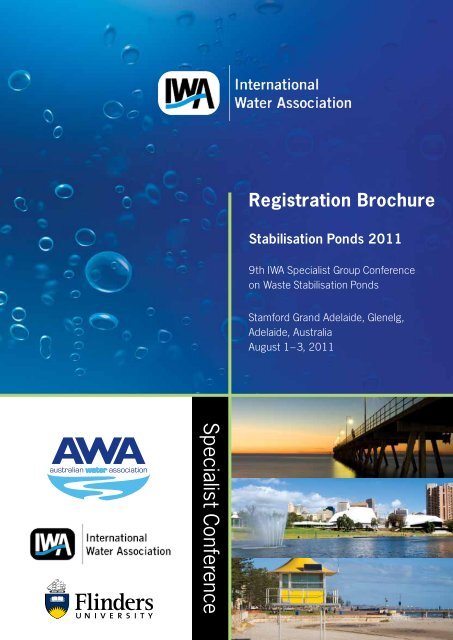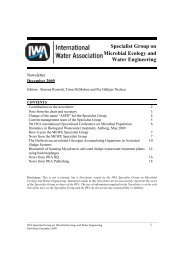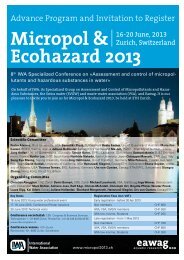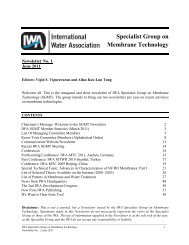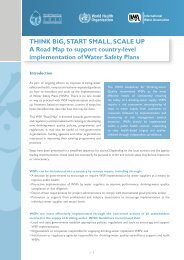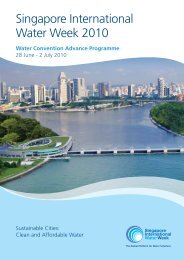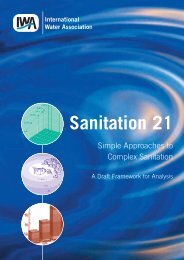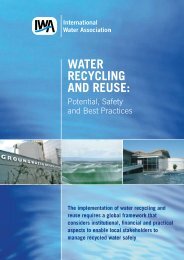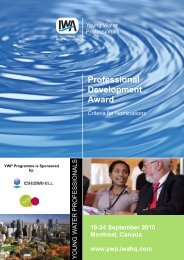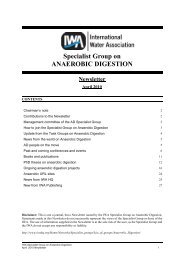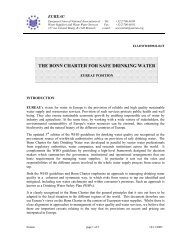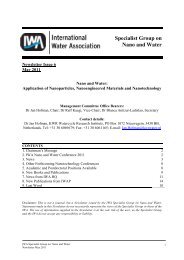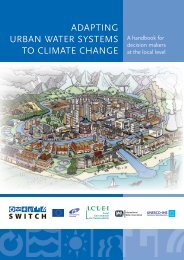Registration Brochure - IWA
Registration Brochure - IWA
Registration Brochure - IWA
You also want an ePaper? Increase the reach of your titles
YUMPU automatically turns print PDFs into web optimized ePapers that Google loves.
<strong>Registration</strong> <strong>Brochure</strong><br />
Stabilisation Ponds 2011<br />
9th <strong>IWA</strong> Specialist Group Conference<br />
on Waste Stabilisation Ponds<br />
Stamford Grand Adelaide, Glenelg,<br />
Adelaide, Australia<br />
August 1–3, 2011<br />
Specialist Conference
Invitation to Register<br />
Waste stabilisation ponds and their allied systems have an important<br />
role to play in the future of wastewater management. There are many<br />
drivers which will lead to a renaissance in this technology. Water utilities<br />
are currently engaging with the ‘energy/water nexus’. How can we<br />
manage wastewater treatment while protecting the environment and at<br />
the same time reduce our impact on climate change via energy<br />
efficiencies or co-generation of energy Furthermore, many parts of the<br />
world including Australia have recently suffered droughts. A response is<br />
to increase wastewater reuse. Waste stabilisation ponds are important<br />
for pathogen reduction in many reuse schemes, contributing to the<br />
management of the exposure risk to public health. The development of<br />
more efficient designs and operating regimes will enhance pathogen<br />
removal and reduce evaporative losses for these systems and contribute<br />
to sustainable water resource management.<br />
These challenges are all themes within the program of the International<br />
Water Association’s 9th Specialist Group Conference on Waste<br />
Stabilisation Ponds. The expert peer review provided by the conference’s<br />
International Scientific Review Committee assures you that the papers<br />
presented within the multi-streamed technical sessions are of a very<br />
high calibre. Your engagement and participation in the conference will be<br />
actively encouraged during the innovative, facilitated Colloquia at the<br />
completion of all the respective conference streams.<br />
We invite you to enjoy the relaxed and friendly host city of Adelaide and<br />
the wider attractions of South Australia, including its fine wines, food<br />
and beaches. The post-conference technical tour will provide an<br />
opportunity not only to visit treatment systems but also to see some of<br />
the hills and vales of South Australia.<br />
We look forward to welcoming you to Adelaide in August<br />
Chair of Organising Committee<br />
Howard Fallowfield<br />
Stabilisation Ponds 2011 Committee<br />
Local Organising Committee<br />
Prof. Howard Fallowfield<br />
Tony Farror<br />
Dr Alex Keegan<br />
Prof. Nancy Cromar<br />
Neil Buchanan<br />
Flinders University (Chair)<br />
South Australian Department of Health<br />
South Australian Water Corporation<br />
Flinders University<br />
Flinders University<br />
International Scientific Review Committee<br />
Chair, Howard Fallowfield<br />
Marcos von Sperling<br />
(Brazil)<br />
Howard Pearson<br />
Nancy Cromar<br />
Jean-Luc Vasel<br />
Bernadette Picot<br />
Rupert Craggs<br />
Miller A. Camargo<br />
Rafael Kopschitz Xavier Bastos<br />
Rejane H. R. da Costa<br />
(Brazil)<br />
Michael Short<br />
Sonia Heaven<br />
Flinders University (Australia)<br />
Federal University Of Minas Gerais<br />
State University Of Paraiba (Brazil)<br />
Flinders University (Australia)<br />
ULg (Belgium)<br />
Universite Montpellier 1(France)<br />
Niwa (New Zealand)<br />
Valero (Colombia)<br />
University Of Viçosa (Brazil)<br />
Federal University Of Santa Catarina<br />
University Of NSW (Australia)<br />
Civil Engineering & Environment (UK)<br />
Venue and Host City<br />
Adelaide’s accessibility has always been positively received by convention<br />
organisers and delegates. In how many other major cities can delegates arrive at<br />
the airport, check into a five star hotel within half an hour, be just minutes from<br />
beautiful beaches and wineries<br />
Adelaide’s modern airport terminal, with state of the art facilities and sweeping<br />
views of the hills and beyond, ensures an exceptional welcome to South Australia.<br />
Located just 15 minutes from Adelaide’s central business district and minutes<br />
from the city’s famous beachside suburbs, Adelaide Airport is arguably the most<br />
conveniently located of all Australia’s capital city airports. Conference delegates<br />
visiting Adelaide are assured a quick, easy and inexpensive journey into the city<br />
centre.<br />
Adelaide enjoys high frequency, direct flights with Malaysia Airlines, Singapore<br />
Airlines, Qantas Airways, Cathay Pacific and Tiger Airways, conveniently connecting<br />
Adelaide to Asia and beyond. Air New Zealand operates direct between Adelaide<br />
and Auckland, connecting Adelaide to New Zealand and the United States.<br />
Adelaide’s central position on the continent ensures the most convenient gateway<br />
to the rest of Australia. Fast, frequent and affordable connections to all major<br />
domestic destinations with the major domestic carriers Qantas Airways, Virgin<br />
Blue, Jetstar Airways and Tiger Airways.<br />
The Stamford Grand Adelaide is located right on the beachfront at Glenelg, and<br />
provides beachside hotel accommodation, less than 20 minutes from the city, and<br />
only minutes from the airport.<br />
Glenelg is a vibrant seaside-shopping community that reflects the casual lifestyle<br />
and relaxing atmosphere of life by the sea. With long sandy beaches, enjoy any<br />
number of leisure activities by the sea including bike riding, sailing, fishing,<br />
shopping, cinemas or eating out.<br />
Program Outline<br />
Monday 1 August 2011<br />
Conference Day 1<br />
Tuesday 2 August 2011<br />
Conference Day 2<br />
Stabilisation Ponds Conference Dinner<br />
Wednesday 3 August 2011<br />
Conference Day 3<br />
Thursday 4 August 2011<br />
Optional Technical Tours
Keynote Speakers<br />
Dr David Cunliffe<br />
Principal Water Quality Adviser<br />
Public Health<br />
Department of Health<br />
Dr Cunliffe is the Principal Water Quality Adviser<br />
with the South Australian Department of Health.<br />
He has 30 years experience in dealing with<br />
public health aspects of water supplies<br />
including risk assessment, regulation of<br />
drinking water quality, approval of major<br />
recycled water systems, assessment of<br />
recreational water quality and investigation of<br />
incidents and water-borne disease.<br />
Dr Cunliffe has contributed to the development of a range of national and<br />
international guidelines including Australian and World Health Organization (WHO)<br />
guidelines for drinking water quality, recycled water use and recreational water<br />
quality. He has participated in applied public health research and has published<br />
on a broad range of issues relating to drinking water quality, rainwater,<br />
desalination and management of recycled water supplies. He is a member of the<br />
WHO Drinking Water Quality Committee and the Australian NHMRC Water Quality<br />
Advisory Committee.<br />
Dr David Batten<br />
Leader, Algal Pre-feasibility Study<br />
CSIRO Energy Transformed<br />
Flagship<br />
David first joined CSIRO in 1970, his work then<br />
culminating in a PhD in Regional Economics<br />
and leadership of the Regional Development<br />
Team. In the eighties, he worked on a global<br />
forest sector model at the International Institute<br />
for Applied Systems Analysis (near Vienna) and<br />
in 1986, he was appointed to a Chair in<br />
Infrastructure Economics in Sweden. From<br />
1991–95, he held the concurrent position of<br />
Professorial Fellow at the Institute for Futures Studies, a scientific think tank in<br />
Stockholm.<br />
During his years in Sweden, David’s work stressed the importance of evolutionary<br />
approaches to industrial development, including the future of biomass, energy<br />
and transportation. He specialized in substitution analysis of new for old<br />
technologies. System analytic tools – that focus on the dynamic<br />
interdependencies between the components of these complex systems – have<br />
underpinned his research and continue to do so.<br />
In 2002, David was invited to return to CSIRO to lead several “One-CSIRO”<br />
activities, including the “Wealth from Waste” Stream in CSIRO’s Water for a<br />
Healthy Country Flagship and CSIRO’s Energy Transformed Flagship. In 2005, he<br />
joined the Alternative Transport Fuels Project as the team’s senior economist and<br />
international analyst, and he began to search for novel pathways for wastewater<br />
streams. He now leads that project.
Preliminary Program - Monday 1 August 2011<br />
0900 - 1030 Keynote Session<br />
1000 - 1030 Morning Tea<br />
1030 - 1200 Theme: Performance of WSP<br />
Nitrogen<br />
1200-1300 Lunch<br />
Eleanor Relton Claire van der Linde,<br />
University of Leeds, UK<br />
NITROGEN TRANSFORMATIONS IN A PRIMARY FACULTATIVE WSP:<br />
SUMMER AND WINTER STUDIES USING 15N STABLE ISOTOPE TRACING<br />
TECHNIQUES<br />
Alexander Aponte R,<br />
Universidad Del Valle, COLOMBIA<br />
ANALYZING NITROGEN TRANSFORMATIONS IN SECONARY FACULTATIVE<br />
PONDS USING MESOCOSMS INSTALLED ON PILOT UNITS<br />
Marcos Von Sperling<br />
Federal University Of Minas Gerais, BRAZIL<br />
EVALUATION OF ENVIRONMENTAL CONDITIONS ASSOCIATED WITH<br />
NITROGEN REMOVAL IN A SERIES OF MATURATION PONDS TREATING<br />
ANAEROBIC EFFLUENT<br />
1300-1500 Theme: Performance of WSP<br />
Design and Modelling<br />
Sonia Heaven<br />
Civil Engineering & Environment, UK<br />
USE OF QUAL-W2 TO MODEL WASTE STABILISATION<br />
POND PERFORMANCE IN SEASONAL CLIMATES<br />
Andres Alvarado<br />
DIUC - Universidad De Cuenca, ECUADOR<br />
CFD ANALYSIS OF SLUDGE ACCUMULATION AND HYDRAULIC<br />
PERFORMANCE IN UCUBAMBA WSP (CUENCA, ECUADOR)<br />
Rafael Bastos<br />
University Of Vicosa, BRAZIL<br />
STATISTICAL CHARACTERIZATION OF RAW WASTEWATER<br />
AND POND EFFLUENT QUALITY PARAMETERS<br />
Mohammadmahmoud Alqadi<br />
National Water Company, SAUDI ARABIA<br />
DESIGN OF FACULTATIVE WASTEWATER STABILIZATION PONDS IN ARID<br />
REGIONS<br />
1500-1530 Afternoon Tea<br />
Theme: Performance in WSP<br />
Agricultural & Industrial Effluents<br />
1530 Rejane Costa<br />
Federal University Of Santa Catarina, BRAZIL<br />
TREATMENT OF SANITARY LANDFILL LEACHATE IN PONDS SYSTEM<br />
UNDER DIFFERENT OPERATIONAL CONDITIONS<br />
1600 Howard Pearson<br />
State University Of Paraiba, BRAZIL<br />
TREATMENT OF LANDFILL LEACHATE MIXED WITH SEWAGE<br />
IN SHALLOW WASTE STABILIZATION PONDS<br />
1630-1730 Colloquium (Performance in WSP and Biology)<br />
Theme: Biology<br />
Vasel Jean-Luc<br />
ULg, BELGIUM<br />
MODELLING OF BACTERIAL SULPHATE REDUCTION IN ANAEROBIC PONDS:<br />
KINETICS INVESTIGATIONS<br />
Natalie Bolton<br />
Flinders University, SA<br />
VARIATIONS IN SUNLIGHT ATTENUATION IN WASTE<br />
STABILISATION PONDS AND ENVIRONMENTAL WATERS<br />
Vasel Jean-Luc ULg,<br />
BELGIUM<br />
A MODEL FOR ANAEROBIC PONDS COMBINING SETTLING<br />
AND BIOLOGICAL PROCESSES.<br />
Theme: Biology<br />
Michael Short<br />
University Of NSW<br />
TEMPORAL ECOLOGY OF ALGAE AND ZOOPLANKTON<br />
IN A TERTIARY WASTE STABILISATION POND<br />
Alexander Aponte R.<br />
Universidad Del Valle, COLOMBIA<br />
MICROALGAE POPULATION DIVERSITY AND STRUCTURE<br />
IN PILOT-SCALE FACULTATIVE PONDS IN TROPICAL ZONES<br />
Elizabeth Gonçalves<br />
Federal University Of Pernambuco, BRAZIL<br />
STRUCTURE AND DYNAMICS OF PHYTOPLANKTON COMMUNITY IN A<br />
STABILIZATION POND IN THE SEMIARID REGION OF BRAZIL<br />
Jason Park<br />
Niwa, NEW ZEALAND<br />
ENHANCING ALGAL BIOMASS PRODUCTION IN HIGH RATE ALGAL POND<br />
Theme: Biology<br />
Andrew Ward<br />
Adelaide University, SA<br />
Bio-conversion rate and optimum harvest interval for<br />
Daphnia carinata fed Chlorella vulgaris grown on digested<br />
piggery effluent<br />
Vasel Jean-Luc<br />
KINETIC MODELLING OF E. COLI AND ENTEROCOCCI DISINFECTION IN<br />
WASTEWATER MATURATION PONDS: EFFECT OF PHYSICOCHEMICAL<br />
PARAMETERS.
Preliminary Program - Tuesday 2 August 2011<br />
0900 - 0950 Keynote Session<br />
V. M. Godinho<br />
Ufmg, BRAZIL<br />
OCCURRENCE AND DECAY OF PATHOGENIC BACTERIA IN A SYSTEM COMPRISED BY A UASB REACTOR AND POLISHING (MATURATION) PONDS IN SERIES<br />
1000 - 1030 Morning Tea<br />
Theme: WSP Case Studies<br />
Case Studies 1<br />
1200-1300 Lunch<br />
Theme: WSP Case Studies<br />
Smaller Communities<br />
1500-1530 Afternoon Tea<br />
Theme: WSP Case Studies<br />
Case Studies 2<br />
Dominic Kerr<br />
North East Region Water Corporation, VIC<br />
IS LAGOON EFFLUENT DISCHARGE TO WATERWAYS SUSTAINABLE<br />
Felicity Roddick<br />
RMIT University, VIC<br />
EXPERIENCE WITH AN ALGAL ONLINE ANALYSER FOR DETECTING<br />
MICROCYSTIS AERUGINOSA IN LAGOON-TREATED EFFLUENT<br />
Humphrey Archer<br />
Beca Infrastructure Ltd, New Zealand<br />
CHRISTCHURCH WASTE STABILISATION POND UPGRADING<br />
Neil Buchanan<br />
Flinders University, SA<br />
THE DISINFECTION PERFORMANCE OF 2 WASTE STABILISATION PONDS IN<br />
THE BAROSSA VALLEY REGION OF SOUTH AUSTRALIA.<br />
Charles Banks<br />
School Of Civil Engineering And The Environment, UK<br />
SEASONALLY LOADED WASTE STABILISATION PONDS: SEMI-CONTINUOUS<br />
DISCHARGE FROM TWO PONDS<br />
Nancy Cromar<br />
Flinders University, SA<br />
NUTRIENT AND BOD5 REMOVAL FROM 2 WASTE STABILISATION PONDS IN<br />
THE BAROSSA VALLEY REGION OF SOUTH AUSTRALIA.<br />
Charles Banks<br />
School Of Civil Engineering And The Environment, UK<br />
SEASONALLY LOADED WASTE STABILISATION PONDS - A NOVEL<br />
APPLICATION FOR INTERMITTENT DISCHARGE<br />
Andres Alvarado<br />
DIUC - Universidad De Cuenca, ECUADOR<br />
BIOKINETIC MODELLING OF A WSP IN COMBINATION WITH A RIGOROUS,<br />
YET SIMPLE MIXING MODEL<br />
David Sweeney<br />
Power and Water Corporation<br />
A RISK BASED APPROACH TO IMPROVE MONITORING AND PERFORMANCE<br />
OF REMOTE WASTE STABILISATION PONDS<br />
Humphrey Archer<br />
Beca Infrastructure Ltd, New Zealand<br />
DESLUDGING PONDS IN NEW ZEALAND<br />
1630-1730 Colloquium (WSP Case Studies and Public Health Microbiology)<br />
Theme: WSP and sustainability issues - carbon, energy & exploitation<br />
of biomass<br />
Bernadette Picot<br />
Universite Montpellier 1, FRANCE<br />
BIOGAS PRODUCTION FROM ANAEROBIC POND IN BURKINA FASO<br />
Howard Fallowfield<br />
Flinders University, SA<br />
PROXIMATE COMPOSITION AND ANAEROBIC DIGESTION OF ALGAL SOLIDS<br />
GENERATED FROM A SMALL COMMUNITY WASTE STABILIZATION POND<br />
SYSTEM IN SOUTH AUSTRALIA.<br />
Peter Cruddas<br />
Cranfield University, UK<br />
ENGINEERING ANAEROBIC PONDS FOR TREATMENT OF TEMPERATE<br />
WASTEWATER<br />
Theme: Public Health Microbiology<br />
V. M. Godinho<br />
Ufmg, Brazil<br />
ESCHERICHIA COLI MEASUREMENTS BY FLUORESCENT IN-SITU<br />
HYBRIDIZATION AND CHROMOGENIC SUBSTRATE TECHNIQUES IN A<br />
SYSTEM OF PONDS IN SERIES<br />
Howard Fallowfield<br />
Flinders University, SA<br />
DIE-OFF RATES FOR E.COLI HELD IN THE DARK<br />
Yacouba Konate<br />
International Institute For Waster And Environmental Engineering<br />
Ouagadougou, BURKINA FASO<br />
OCCURRENCE, REMOVAL AND ACCUMULATION IN SLUDGE OF PROTOZOAN<br />
CYSTS AND HELMINTH EGGS IN ANAEROBIC POND OF BURKINA FASO<br />
Neil Buchanan<br />
Flinders University, SA<br />
THE DISINFECTION PERFORMANCE OF A HIGH RATE ALGAL POND<br />
Theme: Public Health Microbiology<br />
Natalie Bolton<br />
Flinders University, SA<br />
MECHANISMS OF SUNLIGHT INACTIVATION OF COMMON MICROBIAL<br />
INDICATORS IN WSPS<br />
Louise Weaver<br />
Institute Of Environmental Science & Research Ltd<br />
VIRUS REMOVAL BY WSP – LIGHT-INDEPENDENT MECHANISMS<br />
Rafael Bastos<br />
University Of Viçosa, Brazil<br />
QUANTITATIVE MICROBIAL RISK ASSESSMENT APPLIED TO IRRIGATION OF<br />
SALAD CROPS WITH WASTE STABILIZATION PONDS
Preliminary Program - Wednesday 3 August 2011<br />
0900 - 1030 Theme: WSP and sustainability issues - carbon,<br />
energy & exploitation of biomass<br />
Juan Pablo Silva Vinasco<br />
Universidad Del Valle, COLOMBIA<br />
INFLUENCE OF PHOTOPERIOD ON CARBON DIOXIDE, AND METHANE<br />
EMISSIONS FROM TWO PILOT-SCALE WASTE STABILISATION PONDS<br />
Chris Pepperell<br />
GHD, VIC<br />
AN IMPROVED METHOD FOR ESTIMATING FUGITIVE METHANE EMISSIONS<br />
FROM WASTEWATER TREATMENT LAGOONS<br />
Juan Pablo Silva Vinasco<br />
Universidad Del Valle, COLOMBIA<br />
ESTIMATION OF GREENHOUSE GAS EMISSIONS BY STATIC CHAMBERS IN<br />
STABILISATION PONDS: THE MIXING EFFECT<br />
1030 - 1100 Morning Tea<br />
Theme: WSP and sustainability issues - carbon,<br />
energy &exploitation of biomass<br />
Benoit Guieysse<br />
Massey University, New Zealand<br />
THE WATER FOOTPRINT OF WASTEWATER TREATMENT IN WASTE<br />
STABILIZATION PONDS<br />
Allison Reeves<br />
University of Dundee, UK<br />
TOWARDS A CONCEPTUAL MODEL OF A CARBON BUDGET FOR A<br />
FACULTATIVE WASTE STABILISATION POND<br />
Andy Shilton<br />
Massey Uni, New Zealand<br />
GHG EMISSIONS AND THE CARBON FOOTPRINT OF WASTE STABILIZATION<br />
PONDS<br />
1200-1300 Lunch<br />
Theme: WSP and sustainability issues - carbon, energy & exploitation<br />
of biomass<br />
Rupert Craggs<br />
Niwa, New Zealand<br />
ALGAL LIPID PRODUCTION IN WASTEWATER TREATMENT PONDS<br />
Ben Van Den Akker<br />
Water Research Centre, University Of New South Wales<br />
BRING BACK THE PONDS SUSTAINABILITY AND HEALTH IMPLICATIONS OF<br />
PROCESS UPGRADES<br />
Alexander Aponte R.<br />
Universidad Del Valle, COLOMBIA<br />
THERMAL VARIATIONS IN SECONDARY PILOT- SCALE FACULTATIVE PONDS:<br />
CAN WE SAY SOMETHING ON PONDS ENERGETICS<br />
1500-1600 Colloquium (WSP Sustainability and WSP Technology)<br />
Theme: WSP and thier integration with other treatment technologies<br />
Viviane Velho<br />
Ufsc, Brazil<br />
STABILIZATION RESERVOIRS AS A POLISHING TECHNOLOGY FOR PIGGERY<br />
WASTEWATER FROM STABILIZATION PONDS<br />
Rejane Costa<br />
Federal University Of Santa Catarina, Brazil<br />
MATURATION POND AND ROCK FILTER FOR POST-TREATMENT OF<br />
FACULTATIVE POND TREATING PIGGERY WASTEWATER<br />
Servio Cassini<br />
Univ Federeal Es, Brazil<br />
SLUDGE PRODUCTION IN ANAEROBIC POND TREATING SEWAGE, ALGAL<br />
AND PHYSICO-CHEMICAL SLUDGE FROM POLISHING SYSTEM OF<br />
FACULTATIVE POND.<br />
Theme: WSP and thier integration with other treatment technologies<br />
Humphrey Archer<br />
Beca Infrastructure Ltd, NEW ZEALAND<br />
MEMBRANE FILTRATION RETROFIT TO DUNEDIN AIRPORT WASTE<br />
STABILISATION POND<br />
Russell Yap<br />
UNSW, NSW<br />
OPTIMISING DAFF TREATMENT OF ALGAE-LADEN LAGOON EFFLUENT<br />
USING SURFACE CHARGE: A BOLIVAR TREATMENT PLANT CASE STUDY<br />
Rafidah Hamdan<br />
University Of Leeds, UK<br />
AERATED BLAST-FURNACE-SLAG FILTERS FOR THE SIMULTANEOUS<br />
REMOVAL OF NITROGEN AND PHOSPHORUS FROM PRIMARY<br />
FACULTATIVE POND EFFLUENTS<br />
Theme: WSP and thier integration with other treatment technologies<br />
Marcos Von Sperling<br />
Federal University Of Minas Gerais, BRAZIL<br />
IMPORTANCE OF THE AMMONIA VOLATILIZATION RATES IN SHALLOW<br />
MATURATION PONDS TREATING UASB REACTOR EFFLUENTS<br />
Servio Cassini<br />
Univ Federeal Es, BRAZIL<br />
PHYTOPLANCTON ANALYSIS AND NUTRIENTS IN WASTEWATER<br />
TREATMENT SYSTEM WITH ANAEROBIC REACTOR (ABR) AND POLISHING<br />
POND WITH PHYSICO-CHEMICAL SLUDGE PROCESSING.<br />
Conference Colloquia<br />
There will be a unique opportunity to participate in a Colloquium at the end of each theme session. The Colloquia will be facilitated discussion of the papers presented<br />
and will include for example emerging research needs, implications for system design, operation, performance and regulation relevant to the theme session. The main<br />
objective of the Colloquia is to encourage you, the conference participant, to engage in wider discussions of issues relevant to the respective themed sessions.
Post Conference Technical Tour<br />
Thursday 4 August 2011<br />
Many metropolitan and rural South Australians depend upon waste<br />
stabilisation ponds for their sewage treatment.<br />
Tour 1: Bolivar Wastewater Treatment Plant<br />
Time: 0900 – 1300<br />
Cost:<br />
$50 – Limited to 40 delegates<br />
Dress: Casual/comfortable, closed toe shoes<br />
Visit the 150ML/d Bolivar wastewater treatment plant to the north of<br />
Adelaide. The plant incorporates an activated sludge plant, 350 ha of<br />
lagoons and dissolved air flotation-filtration into its wastewater and reuse<br />
treatment scheme. Separated solids are anaerobically digested and the<br />
methane used for onsite electricity generation.<br />
Tour 2: Adelaide Hills and the Barossa Valley<br />
Time: 0900 – 1700<br />
Cost:<br />
$60 – Limited to 40 delegates<br />
Dress: Casual/comfortable, closed toe shoes<br />
Tour 2 will visit the smaller community wastewater management schemes<br />
which receive wastewater from domestic on-site septic tanks into community<br />
managed central lagoons. The tour will visit sites were the treated effluent is<br />
used for irrigation of horticultural crops and grape vines in the wine growing<br />
regions in the Adelaide Hills and the Barossa Valley. The tour will include<br />
lunch in the Barossa Valley and time to sample the produce!<br />
The tour routes will enable participants to be dropped off at the airport<br />
on return to Adelaide.<br />
Social Program<br />
Stabilisation Ponds Conference Dinner<br />
Date: Tuesday 2 August 2011<br />
Time: 1830 – 2200<br />
Venue: Stamford Grand Adelaide (Ballroom)<br />
Cost: $100 per person<br />
The Conference Dinner will be the social highlight of the conference allowing<br />
delegates the opportunity to network whilst enjoying a two course meal served<br />
with beverages.<br />
<strong>Registration</strong> Information<br />
To attend Stabilisation Ponds, register online at www.iwawsp2011.com.<br />
Early bird registration closes on Friday 27 May 2011 AEST. All fees are quoted in<br />
Australian dollars (AUD) and are inclusive of 10% GST.<br />
<strong>Registration</strong> Fees<br />
Early Bird Rate<br />
Until Friday 27 May<br />
2011 (AEST)<br />
Full <strong>Registration</strong>s<br />
<strong>IWA</strong> or AWA<br />
Member<br />
$900 $1100<br />
Non Members $1100 $1300<br />
Full Time Student $500 $600<br />
<strong>IWA</strong> Member<br />
Developing<br />
Country<br />
Day <strong>Registration</strong>s<br />
$600 $800<br />
Per day $500 $600<br />
<strong>Registration</strong> for full time students must be accompanied by a photocopy<br />
of a student card or letter from the University/College declaring full time<br />
student status.<br />
Please visit the conference website for information relating to <strong>IWA</strong><br />
developing countries<br />
<strong>Registration</strong> Inclusions<br />
Standard Rate<br />
Saturday 28 May<br />
until Friday 29 July<br />
2011 (AEST)<br />
Full <strong>Registration</strong><br />
• Attendance at conference sessions<br />
(Monday 1 August – Wednesday 3 August 2011)<br />
• Satchel, including program, book of abstracts, USB containing<br />
full papers and list of participants<br />
• Morning tea and Lunch (Monday – Wednesday)<br />
• Afternoon tea (Monday and Tuesday)
Day <strong>Registration</strong><br />
Day registrants will be entitled to the following on the day(s) chosen:<br />
• Attendance at conference sessions<br />
• Satchel, including program, book of abstracts, USB containing<br />
full papers and list of participants<br />
• Morning tea and lunch (Monday – Wednesday)<br />
• Afternoon tea (Monday and Tuesday)<br />
NB: Even if registering for more than one day, only one satchel and<br />
contents will be issued per delegate.<br />
Method of Payment<br />
Payment of fees must accompany all registration forms.<br />
<strong>Registration</strong>s will not be confirmed until payment is received.<br />
Payment can be made by the following methods:<br />
1. Credit Card: Visa, MasterCard and American Express. Diners Club<br />
is not accepted.<br />
2. Personal or Company cheque (Australian delegates only) made payable to<br />
Australian Water Association<br />
3. International Bank Draft in Australian Dollars drawn on an Australian bank and<br />
branch made payable to Australian Water Association<br />
4. Bank transfer: Please transfer funds in Australian dollars to<br />
Australian Water Association Ltd<br />
BSB: 062104 Account Number: 00146396<br />
Bank Name: Commonwealth Bank of Australia<br />
Bank Address: Artarmon NSW<br />
Swift Code: CTBAAU2S<br />
Cancellation of <strong>Registration</strong><br />
Cancellations must be notified in writing to the Australian Water<br />
Association. Cancellations received before Friday 27 May 2011<br />
will receive a full refund less a $200 administration charge. Refunds<br />
will not be issued for cancellations received after Friday 27 May 2011.<br />
Substitute delegates will be accepted without charge.<br />
Accommodation<br />
Accommodation rates at the Stamford Grand Adelaide start at $185 per night for<br />
conference delegates. For additional accommodation options and to book please<br />
visit the accommodation section on the website.<br />
Travel and Transport<br />
Adelaide’s international and domestic terminals are located 10 kilometres from<br />
the central business district, approximately 15 minutes by motor vehicle. For<br />
more information please visit the Adelaide Airport website: www.aal.com.au.<br />
Taxis<br />
As a general guide, a taxi fare from Adelaide Airport to Stamford Grand Adelaide<br />
accommodation is approximately $30.<br />
Public Transport<br />
A public transport bus service is also available via Adelaide City through to the<br />
north/eastern suburbs, with connections to rail and other bus routes.<br />
Visit www.adelaidemetro.com.au.<br />
Airport Shuttle<br />
Skylink Airport Shuttle specialises in providing a regular scheduled bus service<br />
between Adelaide Airport, Keswick Interstate Railway Terminal and the Adelaide<br />
CBD with set-down and pick-up from most major city hotels. It operates every<br />
day of the year except Christmas Day. For further information,<br />
visit www.skylinkadelaide.com.<br />
Visas<br />
All travellers to Australia, other than Australian and New Zealand<br />
citizens, are required to obtain a Visa to travel to Australia. The Business Visa allows<br />
people attending conferences and meetings in Australia to make a short visit of up<br />
to three months. For more information visit the Department of Immigration and<br />
Citizenship website at www.immi.gov.au or consult your travel agent.<br />
<strong>Registration</strong> Desk<br />
The registration desk will be located outside the Ballroom at the<br />
Stamford Grand Adelaide<br />
Opening Hours:<br />
Monday 1 August 0730 – 1730<br />
Tuesday 2 August 0800 – 1730<br />
Wednesday 3 August 0800 – 1600<br />
Staff will be onsite Thursday 4 August to assist delegates attending<br />
technical tours.<br />
Contact Us<br />
Australian Water Association<br />
PO Box 222 St Leonards NSW 1570<br />
Phone: +61 2 9436 0055 Fax: +61 2 9436 0155<br />
Email: events@awa.asn.au<br />
ABN: 78 096 035 773


